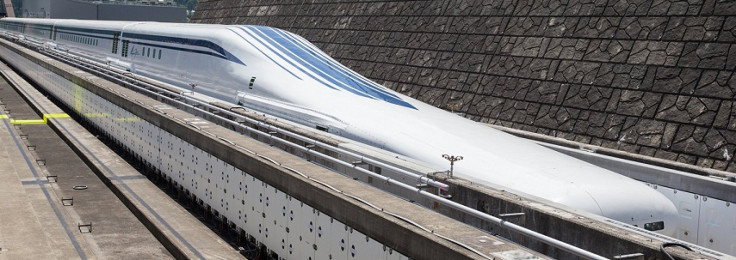World's Fastest Train Reaches 310 MPH In Trials: Japan's L-Zero Maglev Train To Open In 2027

Japan’s magnetic-levitation train is still more than decade away from completion, but the L-Zero recently proved that it really is the world’s fastest train. On a 15-mile stretch of test track, the L-Zero reached speeds of 310 miles per hour.
After the successful trials, Central Japan Railway Co. is going ahead with a 5.1 trillion yen ($52 billion) plan to build a 177-mile maglev line between Tokyo and Nagoya. CJR says the trip will take just 40 minutes on the L-Zero.
Maglev trains like the L-Zero rely on magnetic power to float above the ground, allowing the trains to nearly double the speed of the fastest bullet trains. Two other maglev trains are already operating: a train in Shanghai that travels at about 267 mph and a short-distance, low-speed train in Nagoya.
CJR will begin construction in April and is predicted to be finished by 2027, though many doubt it will be finished in time. Bloomberg points out that Tokyo’s skyscrapers and the Japanese Alps present construction obstacles as the track needs to be a straight line to allow for high speeds.
Demand for travel is also shrinking in Japan due to a decreasing population. Japan is expected to have 10 million fewer people by the time the train will open.
Despite the falling national population, Tokyo continues to grow. Japan is hoping that the L-Zero maglev train will persuade millions of people to fly and drive less.
The L-Zero maglev project is avoiding the budget pitfalls that have plagued high-speed rail projects in California and the U.K. by relying on cash flow, loans and bonds instead of government financing.
CJR had $2.95 billion free cash flow in the fiscal year that ended in March, according to Bloomberg, compared with the $2.42 billion reported by the largest U.S. railroad, Union Pacific Corp (NYSE:UNP). CJR has made a profit every year since 1997, and carried more passengers last year than all airlines in the world. CJR predicts that profits will rise 11 percent this fiscal year.
© Copyright IBTimes 2024. All rights reserved.






















